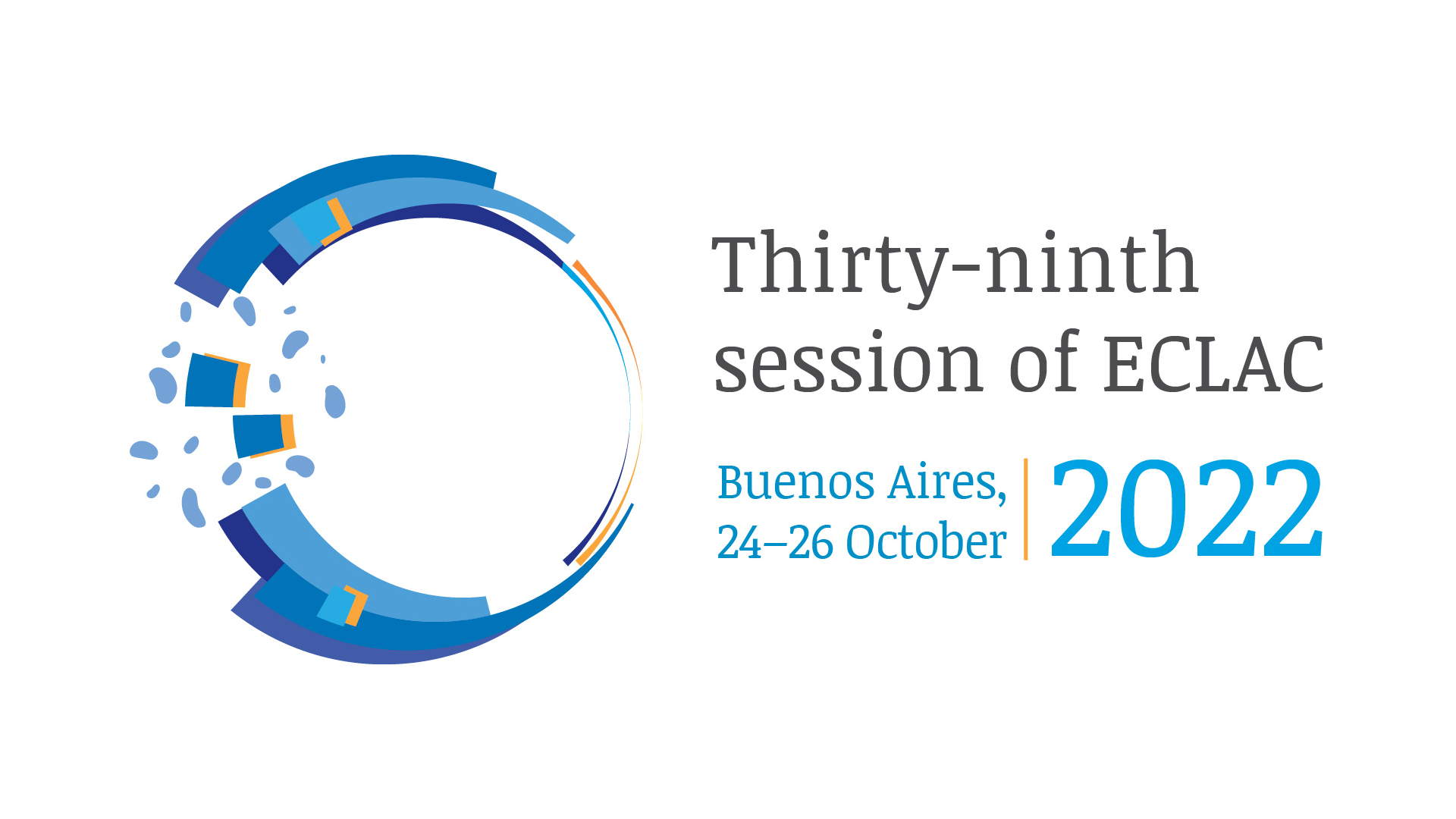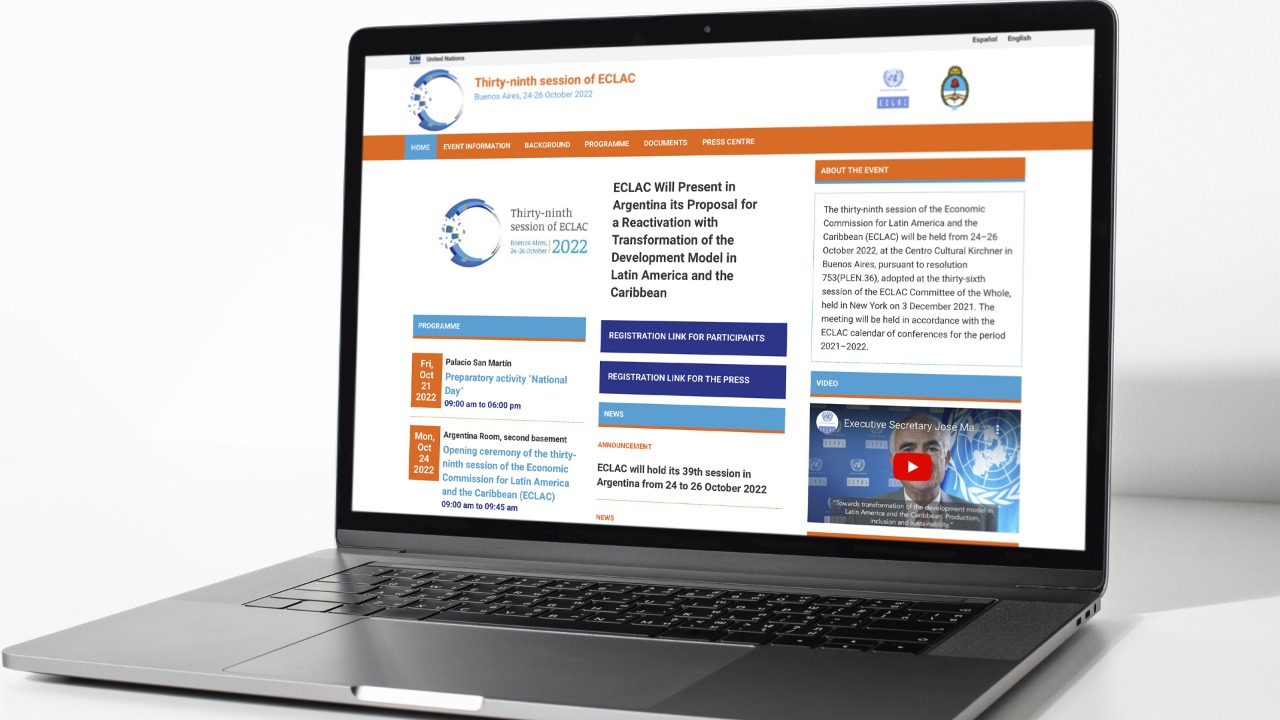It is Time to Raise the Level of Ambition and Promote Transformative Actions for Development in Latin America and the Caribbean
With the presence of Argentina’s President, Alberto Fernández, authorities inaugurated the thirty-ninth session of ECLAC today in Buenos Aires.

The thirty-ninth session of the Economic Commission for Latin America and the Caribbean (ECLAC) was inaugurated today in Buenos Aires, Argentina, with a call to the region’s countries to raise the level of ambition and promote transformative actions for moving towards sustainable and egalitarian development.
The regional commission’s most important biennial meeting, which is taking place in the Centro Cultural Kirchner, was inaugurated by Alberto Fernández, President of Argentina – the country that as of today, and for the next two years, will serve as chair of the organization – and José Manuel Salazar-Xirinachs, Executive Secretary of ECLAC.
Also participating in the opening ceremony were the Minister of Foreign Affairs, International Trade and Worship of Argentina, Santiago Cafiero; the Minister of Foreign Affairs and Worship of Costa Rica, Arnoldo André Tinoco; the Secretary for Strategic Affairs of Argentina, Mercedes Marcó del Pont; the Resident Coordinator of the United Nations system in Argentina, Claudia Mojica; and the Secretary-General of the United Nations, António Guterres, who delivered a message by video.
In his remarks, President Alberto Fernández warned that even before the pandemic and the war in Ukraine, the region’s countries had revealed the existence of problems for growth, for their international insertion, and for distributing income in a more equitable way.
“The current situation demands a critical view and innovative responses for designing policies and solutions made in, and for, Latin America and the Caribbean,” he affirmed.
The Argentine leader underlined that the global crisis has shown the value of solidarity and he emphasized that a lived experience of that magnitude demands that the region’s countries strengthen cooperation and regional partnerships for implementing joint, solidarity-based actions.
“Cooperating is an imperative of fraternity and at the same time a necessary condition for achieving equitable development that does not plunge the men and women who inhabit these lands into poverty. ECLAC offers us an exceptional space for a collective and pluralistic construction that encourages a view that is sensitive to the needs of the region’s countries. A view capable of utilizing the technological revolution to offer new solutions to the development challenges that our region demands,” he asserted.
President Fernández indicated that Argentina, in its capacity as chair of ECLAC, calls for working on a structured agenda based on dialogue, strengthening ties between the region’s countries, and achieving a new position vis-à-vis the rest of the world.
“Our nations need solutions now,” he declared.
Foreign Minister Santiago Cafiero, meanwhile, celebrated the fact that the thirty-ninth session of ECLAC is taking place in Argentina.
“We know that the goal is to reduce the gaps that characterize the situation in our countries. Inequality poses a challenge to us within each of our nations,” he emphasized.
The Foreign Minister of Costa Rica, Arnoldo André Tinoco, in his capacity as outgoing chair of ECLAC, warned that the priorities for the region must continue to be the economic recovery and production, the fight against climate change and biodiversity loss, the fulfillment of gender equality and human rights, and the building of more inclusive and sustainable societies.
“The sustainable energy transition is still pending, along with the digitalization needed for us to insert ourselves in the new engines of development. Let’s continue moving forward on our unified agenda as a region, this is our challenge and commitment,” the Minister indicated.
Meanwhile, Mercedes Marcó del Pont, Argentina’s Secretary for Strategic Affairs, said that for those who are committed to the challenge of development in the region, ”ECLAC has always been a refuge.”
She added that the position document presented by the Commission today “challenges Latin America and the Caribbean once again since it poses that the energy transition, which appears today as a central issue on the international agenda, can be an enormous opportunity for many of our countries, but also a new frustration if we do not promote policies for advancing processes of productive transformation and incorporation of technology.”
In a video message, the UN Secretary-General, António Guterres, thanked ECLAC for seeking innovative solutions based on multilateral cooperation and with the objective of invigorating productive systems and promoting social inclusion, a green transition, and a just digital revolution.
“We arrive at this session in a critical situation. The pandemic’s impacts are compounded by the fallout from the war in Ukraine. ECLAC estimates that 16 countries have not recovered pre-pandemic GDP levels,” the United Nations’ top authority stated, urging countries to put into effect a stimulus plan for the Sustainable Development Goals (SDGs) that would give massive impetus to the sustainable development of countries, including middle-income ones.
In his opening speech, the Executive Secretary of ECLAC, José Manuel Salazar-Xirinachs, thanked Costa Rica, his own country, for serving as chair of ECLAC over the last two years, as well as Argentina, which takes on this role for the next biennium.
He warned that Latin America and the Caribbean is needful and desirous of transformative and bold policies that would offer realistic and pragmatic solutions to its acute shortcomings and economic, social and environmental gaps and that would resolve many of the most basic needs, especially of poor and vulnerable populations, but also of some vulnerable middle strata that suffer the economic cycles’ impact.
“The goal in this post-pandemic era and for 2023 cannot be solely to mitigate the damage of the pandemic and reactivate the economy, as if we could be satisfied with returning to the situation prior to the pandemic and the war in Ukraine. Of course we must mitigate the damage, such as the increase in poverty, informality and inequality, and confront the educational blackout, but this is also about promoting transformative actions for development, it’s about the countries of the region progressing, being able to escape the middle-income trap and fulfill the legitimate dream of being socially inclusive countries based on dynamic, sustained, sustainable and inclusive growth,” he stressed.
After the opening ceremony, the Executive Secretary of ECLAC presented a document entitled Towards transformation of the development model in Latin America and the Caribbean: production, inclusion and sustainability, in which the regional commission urges for redoubling efforts to transform development models and put policies for productive transformation and diversification at the center.
“The document’s main message is that the agenda we must build around is one that could be called of reactivation with transformation, which is to say, one that in the short term would combine the delicate macroeconomic management that the current situation requires, with its complex balances between the need to tackle inflation, reactivate the economy, create jobs and help vulnerable groups, in a context of limited fiscal and monetary-financial space. And that would promote without delay reforms and investments, which will bear fruit in the medium and long term but the implementation of which cannot wait because their cycle for producing results has a longer time horizon,” he explained.
The document was commented upon by a high-level panel moderated by Argentina’s Foreign Minister, Santiago Cafiero, and featuring the Nobel laureate in Economics, Joseph Stiglitz; the Professor in the Economics of Innovation and Public Value of University College London, Mariana Mazzucato; the Minister of Finance and Public Credit of Colombia, José Antonio Ocampo; and the Secretary-General of the United Nations Conference on Trade and Development (UNCTAD), Rebeca Grynspan.
Related event

Thirty-ninth session of ECLAC
The thirty-ninth session of the Economic Commission for Latin America and the Caribbean (ECLAC) will be held from 24–26 October 2022, at the Centro Cultural Kirchner in Buenos Aires, pursuant to…
Related content
Towards transformation of the development model in Latin America and the Caribbean: production, inclusion and sustainability
Presentation of ECLAC's position document of the thirty-ninth session, by the Commission's Executive Secretary José Manuel Salazar-Xirinachs.
Inauguración del trigésimo noveno período de sesiones de la CEPAL
Discurso inaugural de José Manuel Salazar-Xirinachs, Secretario Ejecutivo de la CEPAL (Buenos Aires, Argentina, 24 de octubre de 2022).

Latin America and the Caribbean Must Redouble Efforts to Transform Development Models and Put Policies for Productive Transformation and Diversification at the Center
At its thirty-ninth session, which begins this Monday, October 24 in Buenos Aires, ECLAC will present the region’s countries with its proposal for driving higher, more sustained growth and…

How to Follow the Debates of ECLAC’s Most Important Intergovernmental Conference on October 24-26
The 39th session of ECLAC will be transmitted via all of the institution’s platforms. Those interested can join the conversation using the hashtags #SESeclac2022 and #ReactivationWithTransformation.
Related link(s)
Country(ies)
- Latin America and the Caribbean
Contact
Public Information Unit
- prensa@cepal.org
- (56 2) 2210 2040